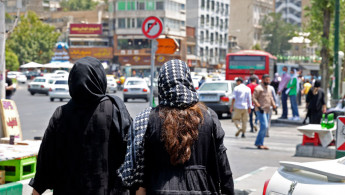Concern grows over health of Iranian woman detained after hijab protest
Concern grew on Friday over the fate of a young Iranian woman who protested on a bus against the obligatory headscarf for women, following reports that she had been subjected to a forced televised confession and hospitalised.
Sepideh Rashno, 28, disappeared in mid-July after becoming involved with a dispute on a Tehran bus with another woman who accused her of removing her headscarf. She filmed the altercation, which went viral on social media.
Activists say she was arrested, although for at least two weeks there was no information over her whereabouts, spawning a viral hashtag "#sepideh_kojast" (where is Sepideh?).
When she re-emerged on July 31 it was not to freedom but on a report broadcast by state run IRIB news where, looking gaunt and pale, she admitted filming the video with her phone.
The Human Rights Activists News Agency (HRANA), based outside of Iran, on Friday reported that she had been hospitalised after suffering a blow to the abdomen while in detention but had been brought back to prison.
There has been no further comment on her case from the Iranian authorities.
HRANA said she remains in custody, held by the intelligence unit of the Revolutionary Guards without access to a lawyer and there was no information about charges against her.
"She's a hero fighting for freedom for all women, for our dignity. We call on international community to support Sepideh, listen to her voice," said the US-based activist Masih Alinejad who encourages Iranian women to remove their headscarves in public and post the videos to social media.
The IRIB report on Sepideh Rashno was fronted by a hugely controversial Iranian reporter Ameneh Sadat Zabihpour who critics dub an "interrogator journalist" and who has in the past carried out purported interviews that activists said were false confessions.
"Dissidents, activists and anyone accused of defying state policies in Iran are often forced to make 'confessions' and 'apologies' on state TV," said the New York based Center for Human Rights in Iran.
The concern over Rashno comes as Iran sees an intensified crackdown marked by a surge in executions, arrests of prominent intellectuals and filmmakers and increased activity by morality police charged with enforcing the obligatory hijab law.
Women have been obliged to wear the hijab in Iran since shortly after the 1979 Islamic Revolution that ousted the shah.
The current campaign against the enforced hijab is spearheaded by Alinejad who has been vilified by the Iranian authorities for her actions.
A man was last week arrested after he was found with an assault rifle outside the New York City home of the journalist, who has in the past also been targeted by a plot to capture and smuggle her back to Iran.





 Follow the Middle East's top stories in English at The New Arab on Google News
Follow the Middle East's top stories in English at The New Arab on Google News
![The UAE is widely suspected of arming the RSF militia [Getty]](/sites/default/files/styles/image_330x185/public/2024-11/GettyImages-472529908.jpg?h=69f2b9d0&itok=Yauw3YTG)
![Netanyahu furiously denounced the ICC [Getty]](/sites/default/files/styles/image_330x185/public/2024-11/GettyImages-2169352575.jpg?h=199d8c1f&itok=-vRiruf5)
![Both Hamas and the Palestinian Authority welcomed the ICC arrest warrants [Getty]](/sites/default/files/styles/image_330x185/public/2024-11/GettyImages-2178351173.jpg?h=199d8c1f&itok=TV858iVg)